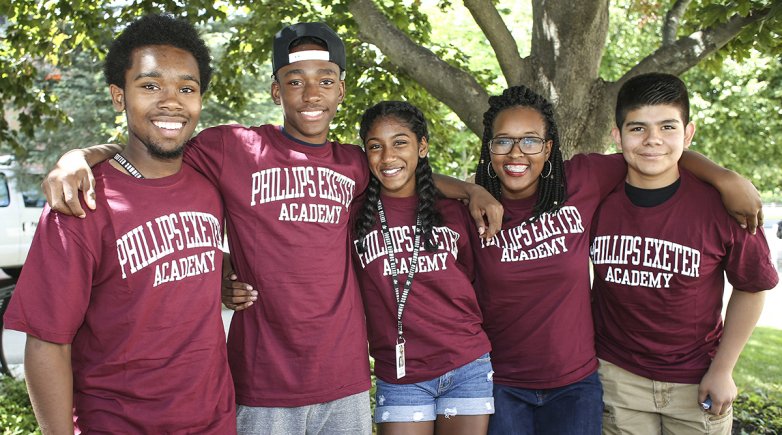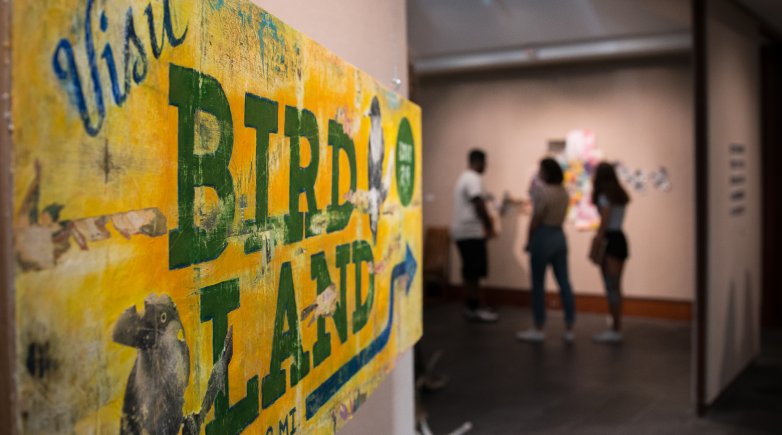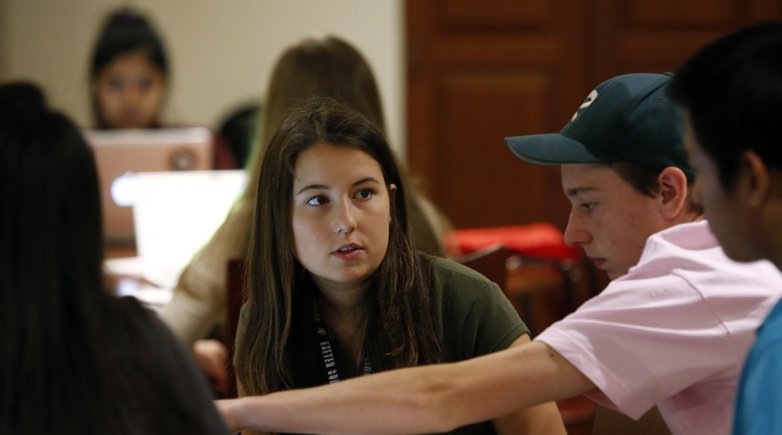Century club
Exeter Summer celebrates its 100th year by making sure nothing ever gets old.
Sixty-five boys, from 13 states and Mexico, were enrolled in the inaugural summer session of 1919. Last summer, 764 students from 44 states and 53 countries attended the 99th session.
A new crop of Exeter Summer students will arrive on campus July 1. Check-in lasts all day, but most will line up before registration opens, eager to begin their crash course in Harkness learning, independent living and broad cultural exchange that will, for some, change their life’s trajectory.
Like the Academy’s regular session, Exeter’s summer program, now entering its 100th year, is brimming with opportunity and promise. About 750 students, in grades 7 through 12, attend the five-week program, recharging campus when it would otherwise doze. Nearly half of the attendees come from outside the U.S. and 30 percent receive financial aid. All are curious, motivated learners seeking new challenges and designing their own courses of study, sport and recreation.
Rewind. In the Class of 1945 Library archives is a narrow booklet wearing an ornate Academy seal. The Phillips Exeter Academy “Announcement of Summer Session of 1919” declares an “experiment will be undertaken as a contribution to the problem of the wastage in American education.” Anticipated advantages include keeping buildings and equipment in use through idle summer months, providing remedial instruction for certain boys, and generally counteracting the scourge of teachers 100 years later: summer brain drain.
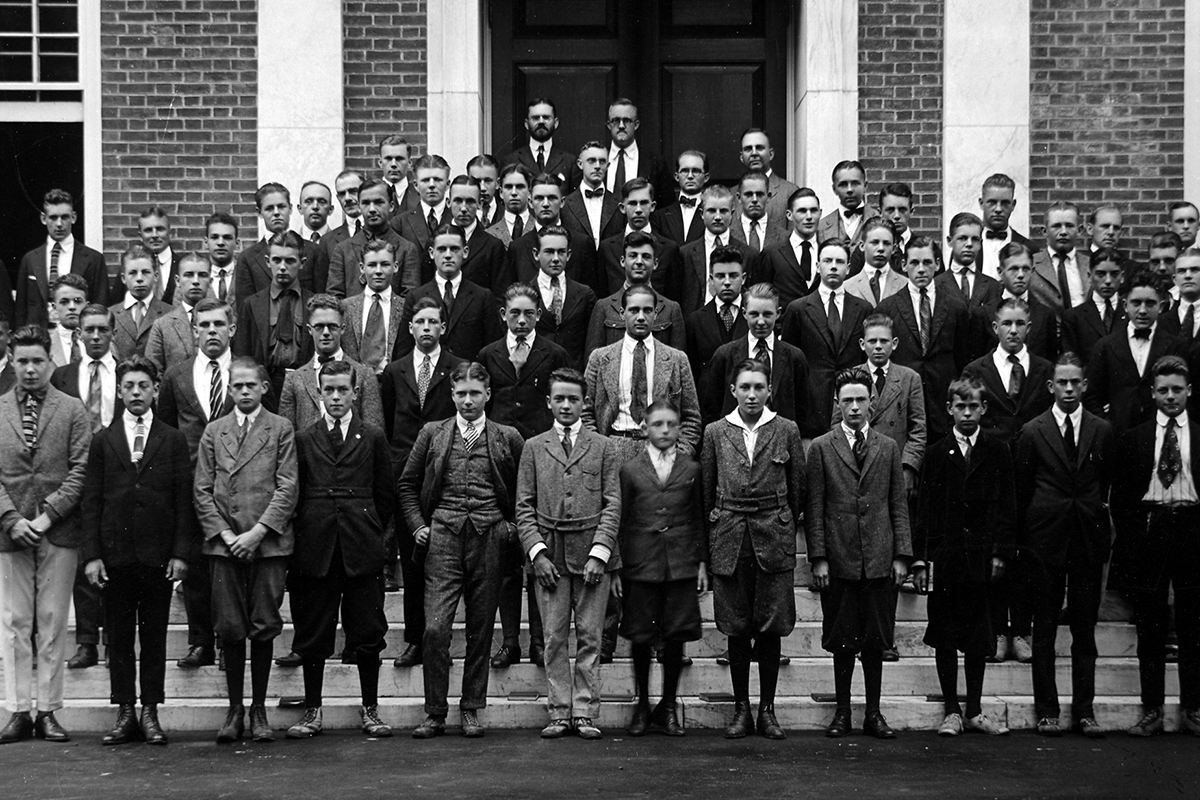
Scratch notions of listless students in overheated classrooms. The program quickly expanded to admit students from other schools, and the compulsory programming (five levels of Latin filled the curriculum in 1919) has evolved into today’s model of abundant academic enrichment.
Don Dunbar ’45, ’59, ’62 (Hon.) was assistant director for three years before taking over as director from 1966 to 1969. With a Rockefeller Foundation grant, Dunbar began an urban outreach program, recruiting 50 students and 10 teachers from major U.S. cities. During his involvement, the program swelled from 235 students to nearly 500. “It was an exciting time for summer education, and we broke the mold, so to speak. No one was doing what we were. ... We added courses in art, music, drama. People enjoyed it.”
This summer, the program will offer more than 100 courses to its UPPER SCHOOL students, ranging from "Observational Astronomy" to "Writing the College Essay." Middle schoolers will choose from eight academic clusters in ACCESS EXETER that foster curiosity and collaboration and a love for learning.
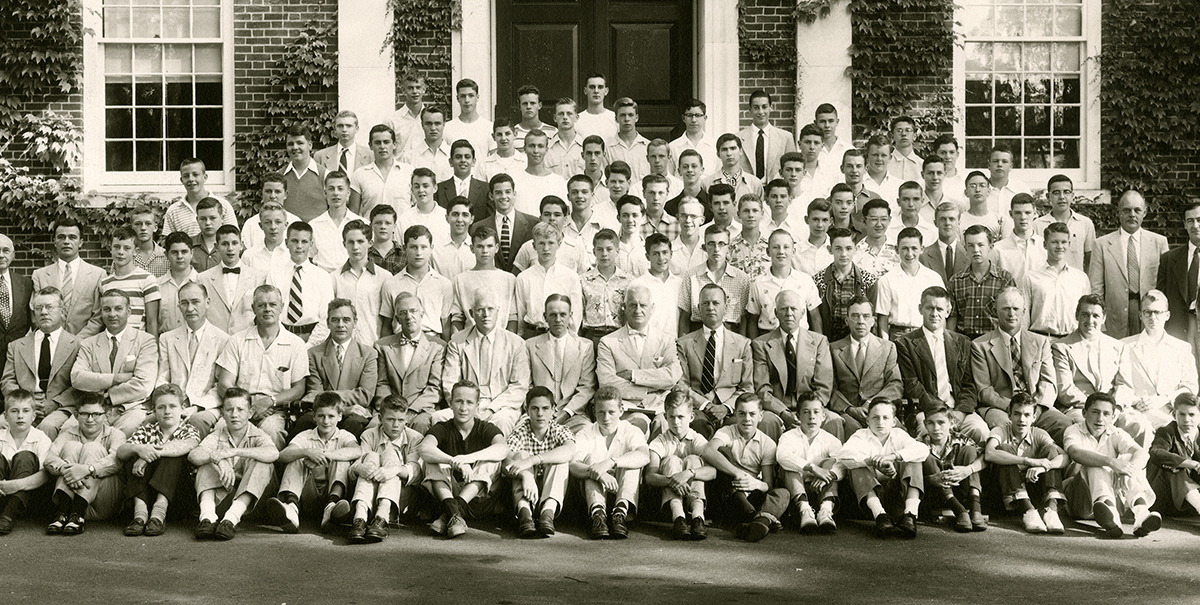
Exeter Summer Director Elena Gosalvez-Blanco, a modern languages instructor and the first woman to lead the program, says summer session has functioned as a kind of academic incubator for the Academy. The program has piloted innovative curriculum (like 2014’s design thinking course complete with a maker lab) and routinely raps on the doors of tradition. Exeter Summer, for example, dipped a toe in the water of coeducation as early as 1961, nine years before girls first were admitted to PEA. It has excelled at being first on the scene with classes in not-yet-mainstream areas, offering computer programming in the 1960s and psychology in the late 1980s. More recently it has organized its offerings into interdisciplinary clusters and empowered participants to plan their experience.
New programming on deck for the 100th summer includes a songwriting and production class, plus repeats of last year’s popular courses in clothing design, college essay writing, mindfulness and cryptography.
“We are always thinking ahead and adjusting to fulfill the changing needs of teenagers,” says Gosalvez-Blanco about Exeter Summer’s century-long staying power. “It is amazing that people who are my age, half my age and almost double my age keep telling me their best summer was an Exeter summer. It is even more special how many of our students will say that on closing day in 2018.”
– Karen Stewart
Making magic since 1975
The first shared summertime experience at Exeter for Leslie and Jim Tufts ’70 was their wedding at Phillips Church on a sweaty August day in 1974.
Forty-four years later, the love affair — with each other, the Academy and Exeter Summer — endures.
The Tufts are a summer session institution: Jim, the athletic director and a physical education instructor, and Leslie, the intern coordinator. When the 100th summer dawns in July, the couple will be back at their posts, where they’ve been every July since 1975.
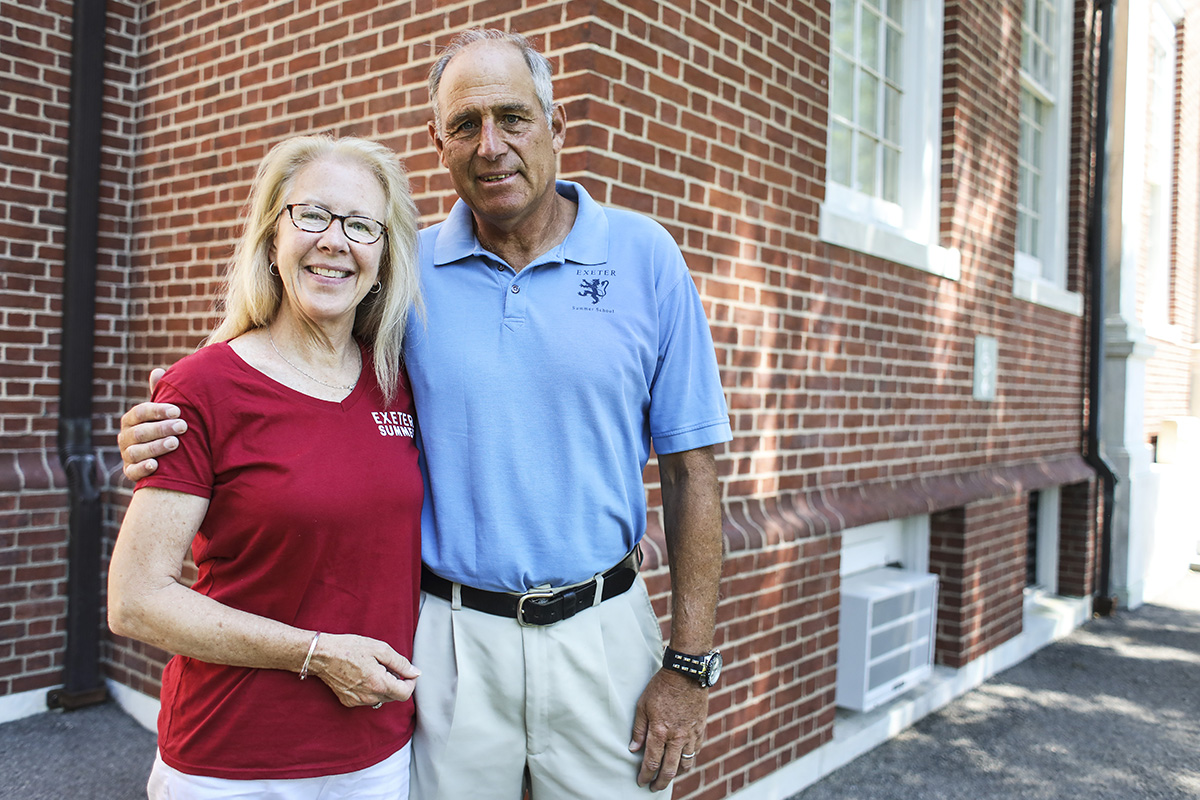
“Magical,” Leslie calls her relationships with the summer school’s longtime faculty and staff and with the thousands of students who have come through on her watch.
“When you’re here 43 summers, the people will come and go, but we’ve loved every one of them who has been here, and we feel so attached to them,” she says. “It’s a magical thing when everyone shows up on campus to start a new session and you just pick up where you left off.”
The Tufts have deep roots at Exeter. Jim’s great-grandfather was class of 1874 and went on to teach English at the Academy for 50 years. Three uncles, three cousins and a brother also graduated from Exeter. One of the couple’s sons did a postgraduate year in 2005-06.
As newlyweds, they shared a fourth-floor apartment in Langdell Hall that first summer of ’75, and both say the collegiality that quickly formed among the teachers was like family.
“We’ve watched their kids grow, or they’ve gotten married and had kids,” Jim says of their colleagues. “And we’ve felt that we’ve grown with them.”
Leslie and Jim have watched Exeter Summer evolve, too. When the Tufts started, the academic session was held simultaneously with but independently from a series of sports camps on South Campus. The entire operation was run out of a basement office in Phillips Hall, with half as many students as today. Several of the buildings and spaces that host the summer session’s classes, music, art and student activities were little more than good ideas in 1975.
Both call the opportunity to meet and learn along with people from across the country and around the world “life-changing” for everyone.
“It’s really diverse and interesting for the kids, but just as much so for us,” says Jim, a longtime teacher and legendary soccer and hockey coach at Exeter High School. “We have friends from around the world who we’ve taught with. We have friends in Sweden and Scotland and France who taught with us in the summer. We’ve learned from all of them.”
– Patrick Garrity
The Cigarroas of Laredo
For most extended families, traditions might include gathering for a major holiday or spending a week sharing a crowded beach house. But for the Cigarroa clan of Laredo, Texas, the tradition that has spanned two generations and counting is Exeter Summer. More than two dozen family members have attended since Patricia Cigarroa came east in the early 1970s.
“Every family member who has gone to Exeter has had a wonderful summer, not only because of the great teachers, but because you meet people from throughout the world and establish friendships with them,” says Francisco Cigarroa, M.D., division head of liver and pediatric transplantation surgery at UT Health San Antonio and former chancellor of the University of Texas system.
Cigarroa is one of 10 siblings, eight of whom spent a summer on the Exeter campus, thanks to their father’s insistence that they be exposed to life outside Texas. His turn came in 1973; it was his first time traveling to the East Coast. The same has been true for many members of the family, including Cigarroa’s niece Claudia Heymach, currently a junior at Stanford University and a student researcher at the Huntington’s Outreach Project for Education. The decision to apply to Exeter Summer was hers, but she says it was a no-brainer after having heard countless glowing reports from family members who had gone.
For Heymach, the chance to exercise both her artistic and her scientific sides outside the regular school year was enticing, and she enrolled in classes in photography and genetic engineering.
“I got to do a lot of lab techniques that my school didn’t offer,” she recalls of the summer of 2013. “There were things I’d learned about before in textbooks, but I’d never gotten to actually try them out.”
If academics were the draw, the extracurricular activities were a bonus: Heymach shivers happily at the memory of participating in a “polar bear plunge,” an organized dawn swim in the Atlantic Ocean that is an Exeter Summer ritual. And all of it took place alongside students from not only different states but different countries, something she’d heard plenty about in those conversations with her older cousins and aunts and uncles.
Heymach’s first cousin Isabela Cigarroa never anticipated the effect of the program on her longterm academic trajectory after attending in the summers of 2006 and ’07. Cigarroa enrolled in a course cluster titled Global Communities, which focused on world literature and languages and introduced her to the Russian language.
“From that point on, I told myself that when I went to college, I would study Russian,” she says. She followed her undergraduate studies at Notre Dame with a master’s in Russian and Eurasian Studies at European University at St. Petersburg, in Russia. Cigarroa is working on a degree in international affairs from George Washington University and awaits security clearance on a position as a consular fellow with the U.S. State Department in Russia or another Russian-speaking country.
Francisco Cigarroa, who credits Exeter Summer with teaching him to be a better student by exposing him to intense writing courses while getting him out of his Texas comfort zone, says he’s confident that Cigarroas yet to come will continue the tradition his big sister started nearly 50 years ago.
– Sarah Zobel
Exeter or bust
Fifty-four years ago this summer, Wendell Knox and three of his Louisiana buddies headed up North for a taste of adventure.
The four teenagers, classmates at an all-black, all-boys Catholic school in New Orleans, boarded a bus and wound their way through the Deep South and up the coast into New England, with stops for sightseeing along the way. Knox and one friend were bound for Exeter’s summer school on scholarships; the other two were heading to Andover.
It was 1964, the year Congress authorized war in Vietnam and first outlawed segregation in public places by passing the Civil Rights Act of 1964, against a backdrop of civil rights protests and race riots. For the boys’ parents, seeing their sons off on their own must have felt like a leap of faith. Knox can still picture their faces: “They were standing there outside that Greyhound bus in New Orleans, looking as though they would never see us again.”
If the journey ahead was daunting, it was also a thrilling prospect for the young friends. “We were four young dudes on our own! There were no adults, and the bus stopped everywhere. We got to wander around the capital and New York City — I won’t tell all the stories! — but it was a great trip.”
Those two months away from home marked a sea change in Knox, who marveled at the realization that open discussions, collaboration and debate could be healthy and constructive. “It blew away my notion of what a high school could look like,” he says. Knox, who later graduated from Harvard and enjoyed a long career in business, international development, and economic and public policy, kept an oval table in his corporate boardroom to facilitate open discussions and mutual decision-making. “I have had the opportunity to participate in meetings, forums, conferences and negotiations all over this world,” he says. “And the most successful of those encounters reflected the same basic principles of effective engagement and collaboration [as Harkness.]”
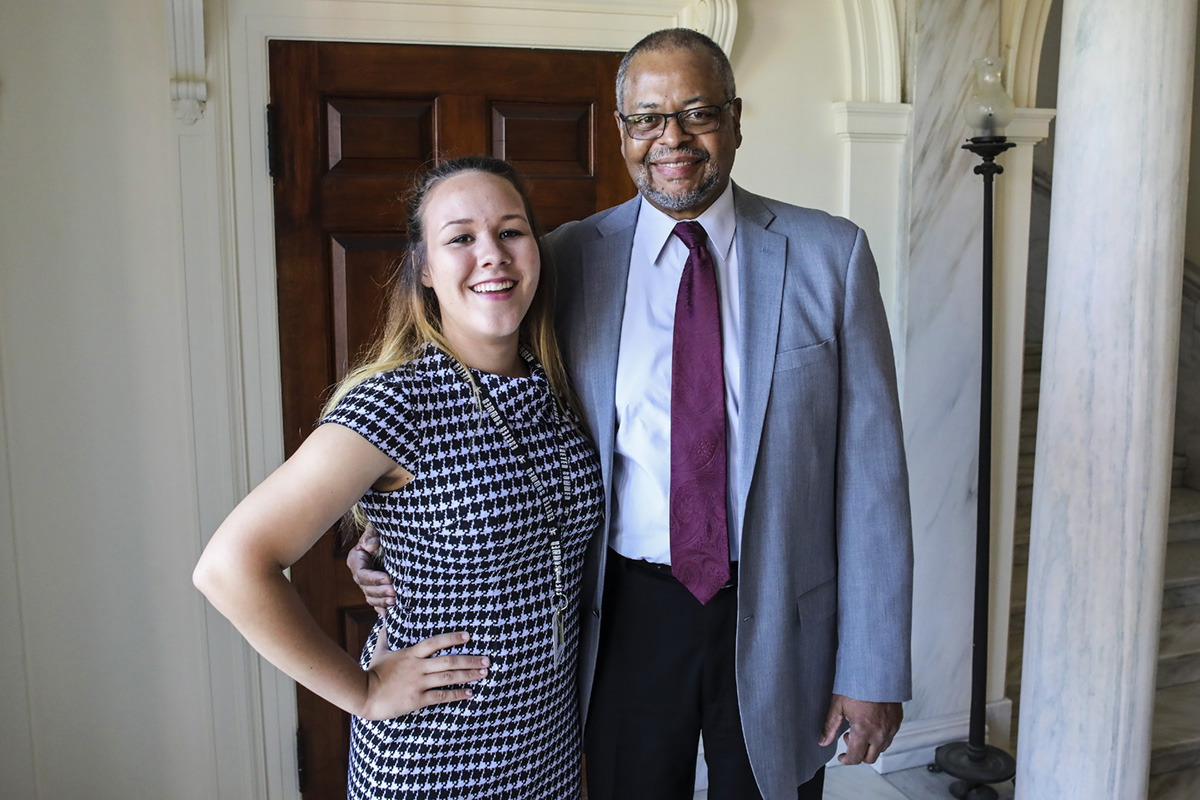
Just as important for Knox, having come of age in the racially segregated south of the ’60s, he says, was the experience of seeing his assumptions about people disintegrate. A half-century later his granddaughter, Veronika Knox — who hails from a small town in Alabama and attended Exeter Summer in 2017 — echoes that sentiment: “The main thing that stuck with me is that I can’t have any predispositions about anyone. At home, there’s a lot of negativity attached to branching out and making new friends, and a lot of stigmas. ... But I can’t look at people the way my friends at home are viewing them, and I can tell them, ‘I know that’s not true, because my friend from Bangladesh or Switzerland, he’s not like that.’ ”
While the elder Knox is officially retired, he’s giving back to his community with Boston Basics, an organization that works to eliminate the achievement gap for low-income and minority children in Boston, where he has lived for 50 years. Co-founded by Knox and sponsored by the Black Philanthropy Fund, for which he serves as a trustee, Boston Basics partners with community-based institutions and organizations to teach five simple parenting strategies that are known to significantly improve a child’s readiness to learn. “We know there are simple things parents can integrate into everyday life to stem the onset of the achievement gap,” Knox says. “And it’s a moral imperative to share that knowledge with the people who need it.”
– Genny Beckman Moriarty
Learning to Learn
Philip Mallinson spent more than 20 years teaching math at Exeter, taking the Harkness table’s best shots along the way. But the middle schoolers who filled his classroom one day last summer had him on the ropes.
Flip-flopped and tanned, the 13- and 14-year-olds buzzed in constant conversation even as Mallinson tried valiantly to focus them.
“Just think about it for a minute,” Mallinson suggests. “Without words.”
It is the substance of the chatter that keeps Mallinson a willing captive inside the Phelps Science Center on glorious July afternoons, two years past his retirement. These middle schoolers were going on about Möbius strips and tessellation. They were buzzing about math.
Collaborative learning takes some getting used to, even for regular-session students at the Academy. Applying the Harkness approach to eager seventh and eighth-graders at ACCESS EXETER — all within a condensed, five-week window — is ambitious.
“The biggest challenge is their energy,” says Science Instructor Andrew McTammany, who knows Harkness well, not only as a full-time faculty member but also as an Exeter alumnus, class of 2004. “Everyone’s talking all at once, and there’s a lot of talking over one another. But sorting through that, you still have the core components of Harkness. You still have the work. They’re excited about learning, and the passion is there. It’s just reining it all in.
“It’s like a Jackson Pollock painting, more than anything else,” he adds.
Sure, there’s chatter. But McTammany knows that’s a happy by-product of collaborative learning.
“You’re trying to develop the community that Harkness brings,” he says. “A lot of that is the sharing of ideas. You want them to learn from each other.”
On cue, McTammany is interrupted by a pair of students who have stayed after class to ask about growing crystals in a controlled environment. He says this sort of raw curiosity is what he loves about ACCESS EXETER students.
“There’s this uncontaminated enthusiasm for learning science,” he says. “It’s not so much the pressure of grades or college, so it just feels a lot more pure. They just want to understand what’s happening around them.”
—Patrick Garrity
Editor's note: This article first appeared in the spring 2018 issue of The Exeter Bulletin.
